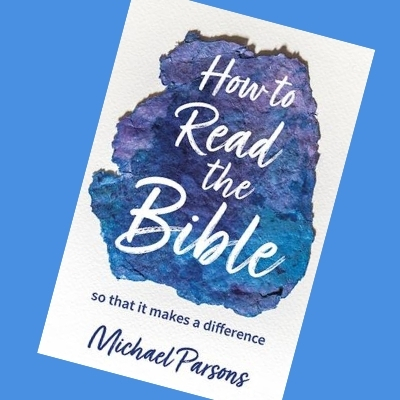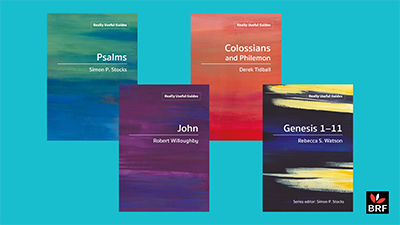Could 2021 be the year you get to know your Bible better? In a new series of articles we’ll be giving tips, highlighting resources and offering encouragement, kicking off with an extract from Mike Parsons’ eye-opening book on the subject, How to Read the Bible…
10 January 2021
‘Not a chore but a daily delight!’
The Bible is at the very core of BRF’s mission and ministry. It’s all in the name! In theory, of course, the Bible is also close to the heart of every Christian. But as one of our most popular writers, David Winter, has said, ‘Most churchgoers only hear the Bible when it’s read to them in church, although they readily admit that they would like to know the Bible better!’
So, at the start of 2021, as the light begins to return, we’re offering a series of articles on how you can get to know the Bible better, beginning with extracts from Michael Parsons’ recent book How to Read the Bible… so that it makes a difference
‘Most churchgoers readily admit that they would like to know the Bible better.’
To read and engage with the Bible, we first need to understand the story, the styles of writing and the approaches we find in the text. Michael’s book covers all these foundations, as well as offering strategies for deeper understanding and engagement.
In his closing pages, he explores the powerful effects of a more informed, confident engagement with the Bible, both for the individual Christian reader and for society at large. He writes:
‘May our reading of scripture fill us with genuine, Spirit-given compassion for those in need so that we might live as Jesus demands… We need a biblically literate church today. May God grant us such to his glory and the growth of his kingdom.’
David Winter’s advice has the ring of a New Year’s resolution:
‘The Bible won’t communicate from the bookshelf or a cupboard! Surely it’s worth giving daily Bible reading a try… I promise you, it’s not a chore, but a daily delight!’
The following are edited extracts from chapter 1 of How to Read the Bible… so that it makes a difference.
What kind of book is the Bible?
In the past, this question was nearly always answered by explaining that the Bible is a kind of library of books written over centuries by various and diverse human writers and inspired by God, its divine author.
This latter assertion, specifically, would give the Bible its authority – these are words from none other than the sovereign God. But this would also imply that the Bible is both inerrant (biblical accuracy) and infallible (biblical trustworthiness). Being the God of truth, it was argued, God simply would not lie nor allow human error to sully its pages.
The Bible was said to be true, therefore, in the sense that it was 100% ‘accurate’ or ‘inerrant’.
What does ‘true’ really mean?
For some, this has become an entrenched position. This is especially the case because several seminal theologians of the church – including Augustine, Aquinas, Luther and Calvin – have in the past argued this, sometimes using the Latin term dictate to suggest a mechanism for the God–human working relationship in creating the Bible.
Today, many would suggest that there is no need to travel this route; indeed, it may be ill-considered to do so. It simply doesn’t seem appropriate or necessary in the light of what the Bible is.
‘Coming after the fall, the Bible takes on the fragility, limitations and fallenness of the world in which we live.’
We notice, first, that the Bible is a created thing. Coming after the fall, it takes on the fragility, limitations and fallenness of the world in which we live and of the authors, editors and preservers who brought it into being, maintained it and curated it.
The great 20th-century Swiss theologian Karl Barth touches on the human quality and limitation of the biblical authors in his usual taut manner in his discussion of the first chapter of John’s gospel. He speaks of the historicity and specificity of the gospel writer’s situation: ‘He is still a man,’ he concludes. And because of this, ‘He has not said it as it is but as he could.’
The truth of the Bible’s message – the self-revelation of God, his salvation in Jesus Christ, the work of the Holy Spirit in the church and the world – is too grand and inexplicable for human authors to fully conceive of. So they write as they can, but they cannot convey it in its entirety or in the hiddenness of its mystery. In Barth’s phrase, the biblical writer ‘does not proclaim God without God’ – indeed, I would emphasise, he cannot.
The word of God
God, then, is somehow involved in the Bible’s authorship. That’s partly why we sometimes use the phrase ‘the word of God’ to describe the Bible. Many theologians today take Barth’s theological conclusion into account, in which he suggests a threefold use for the term ‘the word of God’.
Its primary form is as the incarnate Christ, the Son of God, who in his actions and words is the very self-expression of the living God. For this reason, all the scriptures find their interest in Jesus Christ himself; he is their centre or focal point.
The secondary form of the word of God is the scriptures themselves. They bear witness to God’s self-revelation.
The third form of the word, according to Barth, is preaching which witnesses to, proclaims and applies the word to contemporary contexts.
On the other hand, Gordon Spykman suggests a different set of three forms: the creational word, both in the creation of things and their sustaining; the incarnate word; and the inscripturated word, the Bible.
Whichever suggestion you take, you’ll notice that the Bible is not the primary form of God’s word – it is the second or third one.

Michael Parsons is minister for discipleship at Lechlade Baptist Church. He has previously been a theology lecturer in the UK and Australia and commissioning editor for Paternoster and The Bible Reading Fellowship. He is the author of books on the Reformation and an associate research fellow at Spurgeon’s College, London

To read and engage with the Bible, we first need to understand the story, the styles of writing and the approaches we find in the text. Michael Parsons encourages readers to look at the whole biblical storyline before demonstrating ways of approaching individual texts. Topics along the way include understanding different genres, the importance of narrative, imaginative reading, praying the Bible, difficult passages and what to do with them, and how to apply scripture to our own lives.

Really Useful Guides
Get to grips with the Bible with these exceptionally useful short guides!
Each Really Useful Guide focuses on a specific biblical book, making it come to life for the reader, enabling them to understand the message and to apply its truth to today’s circumstances. Though not a commentary, it gives valuable insight into the book’s message. Though not an introduction, it summarises the important aspects of the book to aid reading and application.
